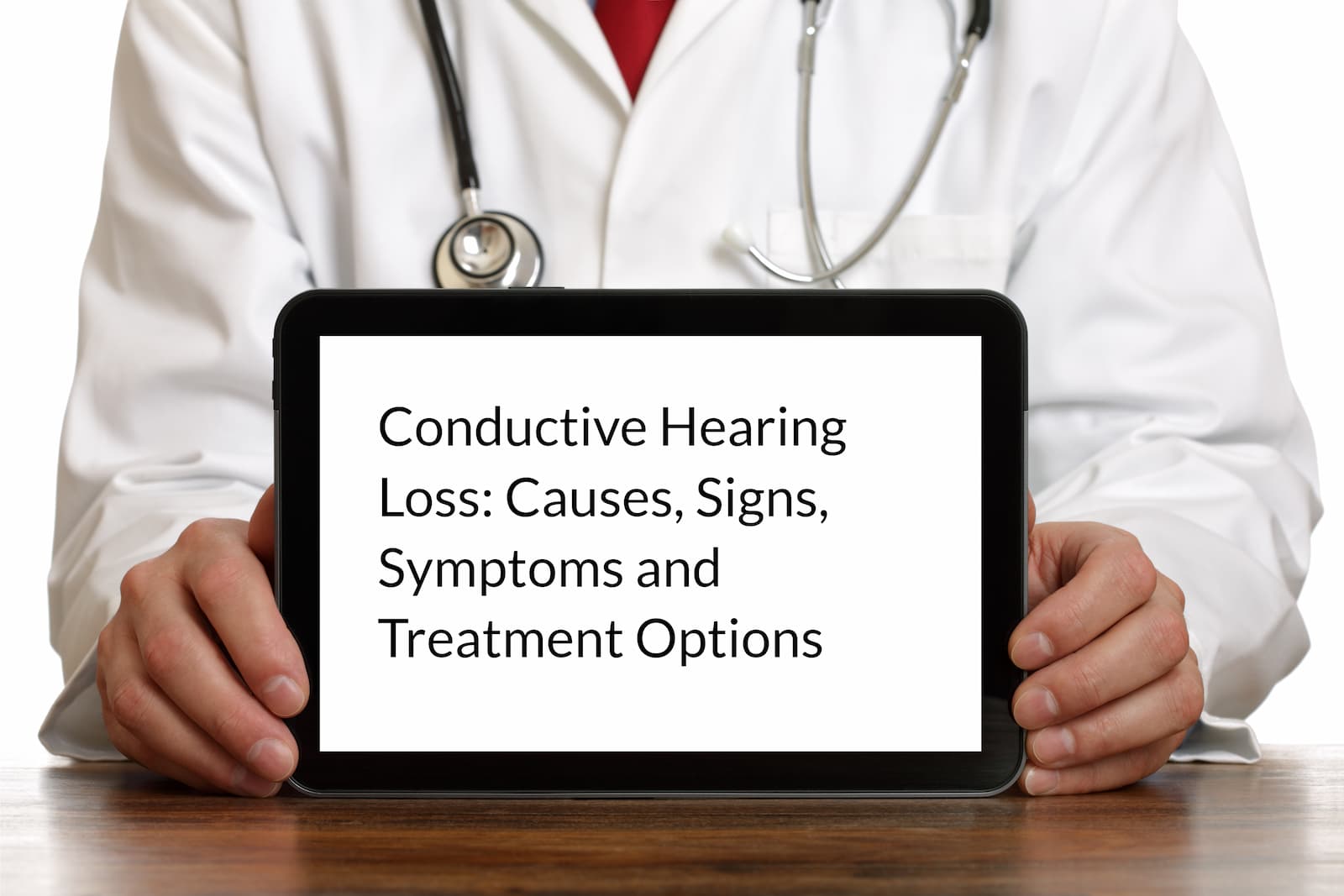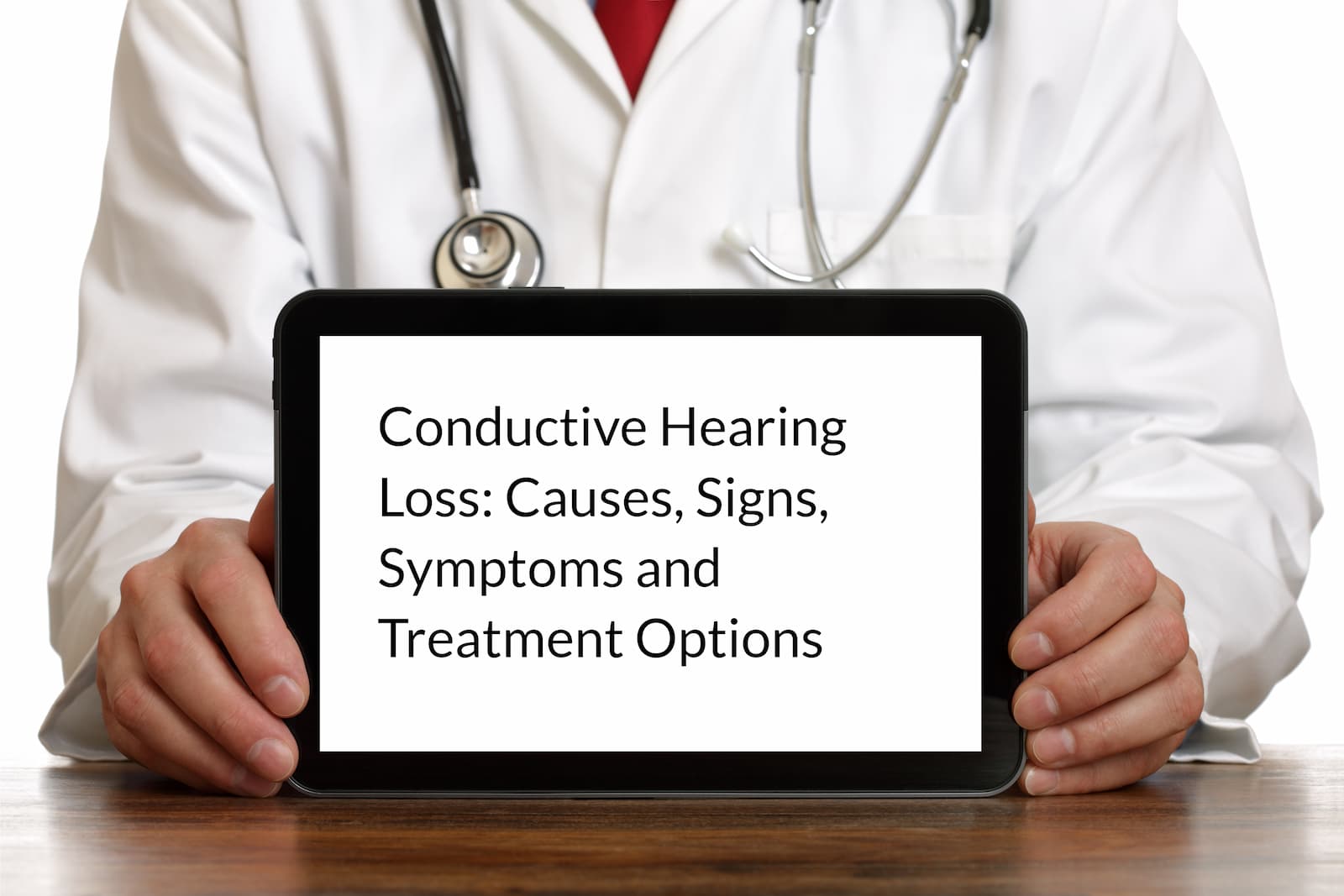Conductive Hearing Loss: Causes, Signs, Symptoms and Treatment Options
March 9th, 2021 | 5 min. read
By Admin


Conductive hearing loss is a prevalent condition that impacts a wide demographic from the elderly all the way down to the very young. It can occur any time something keeps sounds from reaching your middle and outer ear. There are various factors that cause this type of hearing loss.
What Is Conductive Hearing Loss?
This type of hearing loss is caused by a middle ear or outer ear blockage. When sounds can't reach your inner ear, your ear can't turn the sound waves into electrical impulses that would then be sent to your brain. Even if you have a healthy inner ear, your brain won't receive the signals about sounds around you, resulting in you experiencing hearing loss.
Conductive vs Sensorineural Hearing Loss
Some individuals might confuse conductive hearing loss with sensorineural hearing loss.
Conductive Hearing Loss
With conductive hearing loss, the sound isn't reaching your inner ear, typically because of a trauma or obstruction impacting your outer ear. The difficulties can happen anywhere in the middle ear, the ear canal, or the outer ear.
Conductive hearing loss can be treated with medicine, surgery, or hearing devices, and therefore is typically temporary,
Sensorineural Hearing Loss
Sensorineural hearing loss, on the other hand, impacts your inner ear or your auditory nerve. It occurs when sound waves aren't efficiently traveling to your middle or outer ear from the outside world. Basically, the sound signals can't make it to your nerve center where your brain processes them. With sensorineural hearing loss, it's a loss of hearing due to nerve damage and takes place in the cochlea (inner ear) along your nerve pathways connecting your inner ear to your brain. Your middle ear and outer ear are properly functioning, but certain sounds aren't being properly interpreted and might not be reaching your brain.
If you're experiencing problems hearing faint or soft sounds, particularly in a noisy crowd, and you're over 55 years old, it's most likely you're dealing with sensorineural hearing loss. You might feel like you can pick up sounds around you, but they're not very clear.
Sensorineural loss is often called “permanent” hearing loss since there isn’t any medication, pill, or surgery that can help to restore a patient’s natural hearing. This type of hearing loss is only treated using cochlear implants or hearing aids.
Looking For Help With Conductive Hearing Loss in Houston?
Click the image below to request an appointment today!
Causes of Conductive Hearing Loss
Some conductive hearing loss causes might include:
- Earwax: Your body produces earwax normally. Sometimes, it could collect and totally block the canal of your ear, leading to hearing loss.
- Foreign body: This is usually an issue in kids who might put common items like beans or beads in their ears, but could also be seen in adults typically by accident like when a bug gets into their ear.
- Swimmer's ear: This is known as otitis externa. It's an ear canal infection frequently related to cotton swab use or water exposure.
- Bony lesions: These are usually associated with cold water swimming and are non-cancerous bone growths in your ear canal.
- Aural atresia (defects of your external ear canal): This is typically noted at birth and frequently seen with outer ear structure defects (microtia).
- Eardrum problems: There are a number of eardrum issues. For example, you could have a hole in your eardrum. Some individuals are born without an outer ear. Others might have an issue with their middle ear bones or have a deformed ear canal. There are also benign tumors that block the middle or outer ear.
- Middle ear infection or fluid: You can get an infection in your middle ear (otitis media). You can also get fluid in your ear caused by allergies or colds. It could also be due to poor Eustachian tube function. Middle ear fluid drains out through this tube, however, fluid in your middle ear can become stuck if this tube isn't working properly.
- Eardrum collapse: Serious imbalance of middle ear pressure could lead to poor function of your Eustachian tube, which can cause the collapse of your eardrum on your middle ear bones.
- Cholesteatoma: This is where you have skin cells present in your middle ear area that aren't typically there. When you have skin present in your middle ear, it's known as cholesteatoma which can start as a pocket or a lump, but can grow, causing damage to the bones.
- Otosclerosis: An inherited disease where your stirrup bone or stapes in your middle ear fuses with the bones surrounding it, failing to vibrate properly.
Signs and Symptoms of Conductive Hearing Loss
Because your auditory nerve and sensitive inner ear are intact, when you're struggling with conductive hearing loss, you mainly have problems with your overall sound loudness, but not the clarity. People with this type of hearing loss frequently find they need to turn the volume up on their TV or radio and then they're able to hear better.
Some symptoms common with conductive hearing loss are:
- Pain on one or both your ears
- Easier to hear out of one ear than the other
- A feeling that your own voice sounds different or louder
- Pressure sensation in one or both of your ears
- A foul odor coming from your ear canal
- Frustration or difficulty with phone conversations
Conductive Hearing Loss Diagnosis
It’s essential to know which hearing loss type you’re struggling with and this will require a skilled and trained professional to decide on the proper hearing test. This isn’t something you can measure accurately with a hearing test app or a standard hearing screening. You require the diagnostic skills of an audiologist; not a test performed at a big box store.
Determining how much hearing loss you have, what type, in which ear, and at what frequency can often be complex and drastically alter the treatment option and/or hearing aid settings.
Conductive Hearing Loss Treatment Options
Most conductive hearing loss cases are temporary and appropriate treatment will cure it, therefore it's essential you seek medical assistance right away.
If you're experiencing hearing loss, you'll want to see an Ear, Nose, and Throat (ENT) specialist or otolaryngologist who will give you your diagnosis and discuss options of treatment, including surgical procedures.
A crucial part of the assessment is an audiogram (hearing test) that and an audiologist performs to determine how severe your hearing loss is, and identify if you have conductive hearing loss or sensorineural hearing loss, or a mixture of both.
Depending on your hearing test results, physical exam, any other test results (i.e. MRI or CT), the specialist will make a recommendation on the best treatment option for your case.
Conductive Hearing Loss treatment options might include:
1. Surgery: This might help to correct this type of hearing loss that's due to things like:
- Failure of your ear canal to be open at birth
- Congenital absence of ear canal
- Dysfunction of your middle ear structures
- Malformation
- Otosclerosis
2. Antifungal medications or antibiotics: These are used to treat chronic middle fluid or chronic ear infections.
3. Amplification: This might be a solution with a surgically implanted, osseointegrated device (i.e. Ponto or Baha System), a bone-conduction hearing aid, or a conventional hearing aid, which depends on the hearing nerve status.
Hearing aids today are sophisticated digital devices. They help by analyzing sounds around you, amplifying the sounds you’re struggling to hear, and helping you focus on essential speech sounds. They also help to decrease distracting background sounds and ensure you hear exactly what you’re looking to hear.
Contact Houston Hearing Center to Schedule Your Appointment
Houston Hearing Center has been helping the Houston community individuals of all ages for over 100 years to hear better. Our audiologists also work together with doctors at Houston Ear, Nose, Throat & Allergy to offer our patients with outstanding hearing and balance care. We use treatment plans individualized to each patient. Our multidisciplinary method means you will receive seamless audiological and medical care. Contact us today to set up your appointment.
Lorem ipsum dolor sit amet, consectetur adipiscing elit, sed do eiusmod tempor incididunt ut labore et dolore magna aliqua. Sed risus ultricies tristique nulla aliquet enim.
Topics: